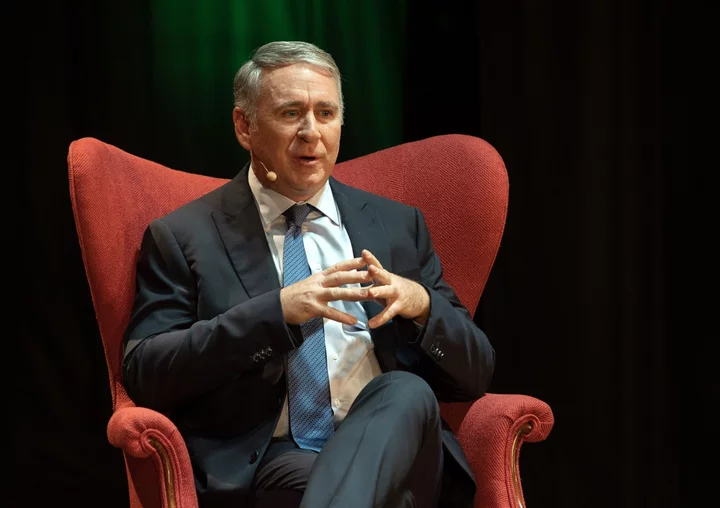Citadel founder Ken Griffin rebuffed regulators’ critique of the so-called basis trade, saying their efforts are “utterly beyond me.”
Hedge funds and others who employ the strategy are helping to provide liquidity and fund the Treasury market efficiently, reducing costs for taxpayers, Griffin said Wednesday at the Robin Hood Investors Conference in New York, according to people familiar with the matter.
“This is totally lost on Gary Gensler and totally lost on the Fed,” Griffin said during a conversation with fellow billionaire Paul Tudor Jones.
Gensler, the Securities and Exchange Commission chair, and the central bank “seem to be more consumed with this theory of systemic risk from this trade than from the fact that we’re saving tens of basis points in cost for the American taxpayer, which is billions of dollars a year by allowing this trade to exist,” Griffin said.
US regulators are zeroing in on dangers posed by highly leveraged hedge fund wagers — particularly the basis trade, which uses leverage to profit from the price gap between Treasury futures and the underlying cash market — and considering options to rein in risks to the broader financial system, Bloomberg reported last week.
QuickTake: What’s the Basis Trade? Why Does It Worry Regulators?
The funding that prime brokerages provide to some hedge funds on a “very generous basis” is the biggest source of risk in the financial system, Gensler said last week.
Griffin, 55, also said Citadel’s hedge fund has “a large basis portfolio” that lost money in March 2020. He added that the losses, relative to the firm’s overall equity capital base, weren’t meaningful.
Jones, who runs hedge fund Tudor Investment Corp., said his firm’s basis trade portfolio “was in extreme duress” in March 2020 and that “the Fed’s entrance in the market bailed that particular book out.” While it didn’t affect the firm’s overall profit and loss, it “was a huge stress,” he said.
Read More: US Weighs Leaning on Banks to Curb Hedge Fund Leveraged Trading
Griffin also addressed his market-making business, Citadel Securities, saying that the largest risk it faces is when pricing correlations between assets go “off the rails.”
The firm uses its own balance sheet to facilitate trading across securities including stocks, bonds and rates and takes on an “enormous amount of overnight risk” as it seeks to provide liquidity to the markets, Griffin said. “When you see repeated divestitures by market participants in the same direction day in and day out, that really puts a lot of pain into our portfolio.”
Gensler has pointed to Citadel Securities’ dominance in equity markets as emblematic of a competitive problem in the industry. His staff presented proposals that would rework US market structure to move more trading into the open, onto public exchanges. Citadel Securities and other industry participants have warned those proposals could harm investors and dampen market liquidity.
On Politics
While 35% of Republicans are hard-core supporters of former President Donald Trump, Griffin said that 65% could be open to voting for other candidates, naming Ron DeSantis, Nikki Haley and Chris Christie.
Griffin, a prominent Republican donor, said he has been disappointed with some recent DeSantis policy decisions that resulted in the “diminution of personal rights.”
He called Haley, a former South Carolina governor and US ambassador to the United Nations during the Trump administration, “a rock star” on the campaign trail and in debates.
“She’s got the experience to be in the Oval Office,” Griffin said. “She’s one to really watch.”
--With assistance from Katherine Doherty, Katherine Burton and Austin Weinstein.
(Updates with Tudor Investment Corp. in eighth paragraph, Citadel Securities in ninth, Republican candidates starting in 12th.)









